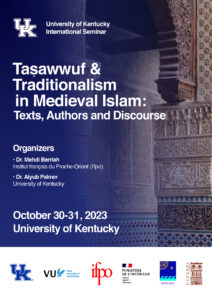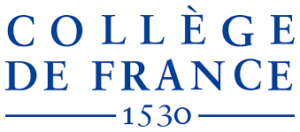Tasawwuf and Traditionalism in Medieval Islam
 Programme
Programme
Lundi 30 octobre
08:45 – 09:00 Opening : Words of welcome, Mehdi Berriah Aiyub Palmer
09:00 – 10:45 : Approaching Traditionalism through the Prism of Sufism
Chairman: Mehdi Berriah
- Aiyub Palmer (University of Kentucky), The Role of ḥikma as an Alternative to Kalam in al-Ḥakīm al-Tirmidhī’s Kitāb al- Ḥikma
- Fareeha Khan (Willamette University), What is Islam?: The Perspective of the Sufi-Jurist
- Abolfazl Moshiri (research Associate at the Elahé Omidyar Mir-Djalali Institute of Iranian Studies, University of Toronto), Between Antinomianism and Tradition: Shams-i Tabrīzī and His Maqālāt
10:45 – 11:30 : Coffee break
11:30 – 12:30 : Sufism and the Hanbali School
Chairman: Aiyub Palmer
- Hala Abdel Meguid (CERMOM, Paris), The Compatibility of Hanbalism and Sufism Through the Story of the Christian physician the Kitāb al-Tawwābīn of Ibn Qudamā’ al-Maqdisī (D. 620/1223)
- Arjan Post (KU Leuven), Traditionalist Tendencies amongst the Ḥanbalī Qādirīs of Mamluk Damascus
14:00 – 15:15 : Sufis at War
- Mehdi Ghouirgate (University of Bordeaux), The ribāṭ or the Genesis of Sufism in Western Islam
- Mehdi Berriah (Institut français du Proche-Orient), Sufi and Mujāhid: the participation of Sufis in the Mamluk war effort
15:15 – 15:45 : Coffee break
15:45 – 17:00 : Hadith’s Importance in Sufism
Chairman: Mehdi Berriah
- Abdenour Padillo (The Spanish National Research Council, CSIC), Negotiating boundaries. Sufism and Hadith in al-Andalus
- Gavin Picken (Hamad Bin Khalifa University), Synthesizing Tradition and Spiritual Purification: The Role of Ḥadīth in the Works of al-Ḥārith al-Muḥāsibī
- Mohammad Mushtak (Jamia Millia Islamiaa Central University), A Sufi-Interpretation of Hadith Literature
Mardi 31 octobre
09:00 – 10:30 : Sufism and the Clash with Exoteric Legalism
Chairman: Aiyub Palmer
- Kamal Gasimov (University of Michigan), Worldviews in Conflict: The Head of the Sufi Lodge Against the “Scholars of Formalities”
- Farid Bouchiba (University of Le Mans), The subḥa: tradition or innovation?
- Wassem Farooq (Refence and Instructional Librarian at the Aga Khan Library, London), Was al-Fatāwá al-ṣūfīyah confined to archives of the discarded due to its weakness in hadith?




